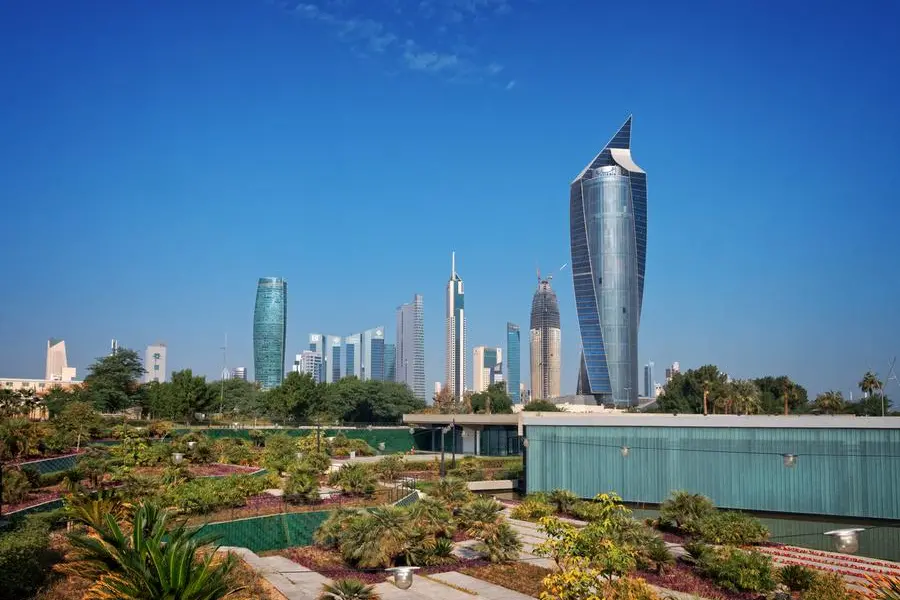PHOTO
KUWAIT CITY: The Central Bank of Kuwait on Thursday declared in a statement the conclusion of the mission by experts of the International Monetary Fund (IMF) in the country, as part of regular annual consultations.
The IMF experts affirmed that the pace of the economic recovery slowed down and the actual Gross Domestic Product incurred contraction estimated at 3.6 percent in 2023, forecasting an identical drawback at 3.2 percent in 2024.
The CBK statement said the IMF experts indicated that the GDP oil sector shrank by 4.3 percent, and nonoil sectors by one percent, due to a slump of oil prices, output volume, and decline of industrial activities in the refining sector.
The IMF team recorded a decline of the GDP this year by 3.2 percent because of an additional cut in oil production, forecasting growth at 1.3- in the non-oil sectors this year, despite constrictions in the public financial situation.
As to local prices, the team recorded that the annual growth dropped by 3.6 percent last year due to the decrease of the benchmark growth, commodities prices, indicating a substantial decrease in the recent period by 2.9 percent (August), due to the decline of the rates in housing and transports.
The team forecasts a continuous decline of the annual growth rates to reach three percent this year along with a drop in the demand and fall of the prices of imported food.
As to the internal and external balances, the IMF experts recorded that they fell back last year as a result of the drop in the oil prices and output, where the budget recorded the transformation of a surplus of 11.7 percent of the GDP in the fiscal year 2022-2023 into a deficit at 3.1 percent in 2023-2024, along with the rise of the current expenditures by 9.7 percent of the GDP.
Civil servants’ payments and subsidies accounted to 5.7 percent and 3.4 percent, respectively, of the GDP, while the surplus in the current account shrank reaching 31.4 percent of the GDP in 2023, along with a fall of the surplus in the trade balance for the commodities and services, 10.3 percent of the GDP, due to fall of the prices and output of the oil -- compensated by the increase in the surplus of the income balance by 7.4 percent of the GDP.
The experts have affirmed that the Kuwaiti banking sector is solid due to sagacious supervision by the CBK concerning lending and allocations, as the results of the stress tests conducted by the central bank have shown that the proportions of liquidity and capitalization in the sector have exceeded the minimum required by Basel-2 terms, while the irregular loans remain low.
The experts lauded the CBK’s rational policies for managing hazards, noting that the crediting slowness resulting from the epidemic started to recede gradually, for the CBK hedging measures were adequate for containing the risks. The rating of the Kuwaiti dinar, pegged to a basket of currencies, is a sound foundation for the monetary policy, the experts recorded, opining that it contributed to stemming inflation for many years.
Moreover, the experts lauded the CBK restrictive policies at the local level, noting that the current interest rate is in harmony with the containment of inflation and stability of non-oil sectors’ output. They noted that the Kuwaiti economy is prone to be affected by various external hazards due to its dependence on oil. At the local level, the hazards largely emanate from drawbacks in implementing the financial and structural reforms that are necessary factors to diversify the economy and lessen dependence on oil. The Kuwaiti authorities are aspiring to execute reforms to back up a dynamic and diversified economy and for that sake, the general financial conditions must be kept under control, namely concerning expenditures and non-oil proceeds.
The IMF experts recommended allocations for the public sector, gradual finnish of energy subsidies, and setting up a system to back energy expenses for the limited income class. And for the sake of hiking non-oil proceeds, the added tax value and the commodity fees must be enforced. The IMF experts lauded the government's plan to expand the income taxes on companies to cover all local conglomerates, also advising that the labor market needs to be reformed. To encourage Kuwaitis to seek jobs in the private sector, there needs to be a balance of the compensation and work conditions between the private and public sectors. Moreover, improving the quality of education will lead to increasing productivity and diversifying the economy.
Arab Times | © Copyright 2024, All Rights Reserved Provided by SyndiGate Media Inc. (Syndigate.info).




















